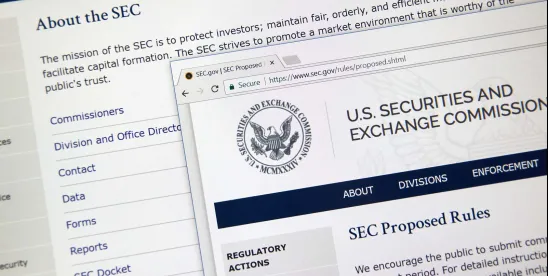President-elect Donald J. Trump nominated Paul Atkins to succeed Gary Gensler as Securities and Exchange Commission (SEC or Commission) Chair on December 4. Atkins was an SEC staff attorney under SEC Chairs Richard Breeden and Arthur Levitt, an SEC Commissioner between 2002 and 2008, and later founded Patomak Global Partners (Patomak), a financial services consulting firm. Atkins resigned as an SEC Commissioner six weeks before Lehman failed in September 2008. He also served as a commissioner under Harvey Pitt and saw that Pitt's reluctance to regulate the accounting profession largely led to his undoing. Hopefully, he has learned from these experiences.
Atkins is not an enemy of the SEC, the Financial Industry Regulatory Authority (FINRA) or the Public Company Accounting Oversight Board (PCAOB). He just wants them to operate differently, in a way he believes is more consistent with the value they add to the public interest. For example, Atkins wants enforcement to be busy and tough but punishing the kind of misconduct that protects the public effectively. He supports rules but in ways that protect investors without stifling valuable innovations. He wants FINRA and PCAOB to utilize resources wisely and to be held accountable to the SEC when doing so.
Mr. Atkins is widely regarded as "crypto-friendly," and the crypto industry has celebrated his nomination. Atkins will be joined on the Commission by two of his former clerks, Commissioners Hester Peirce and Mark Uyeda. As a result, a majority of the commissioners will likely be very supportive of Atkins' priorities during his term as chair. 1
Below, we highlight some of Atkins' past positions regarding (i) enforcement, (ii) rulemaking, (iii) self-regulatory organizations (SROs), and (iv) examinations, which may provide a roadmap for what his regulatory agenda will look like if the Senate confirms his nomination. Additionally, we examine past statements of current SEC Commissioners Hester Peirce and Mark Uyeda, which may shed light on the priorities of the next Commission.
Enforcement
Moving Away From Regulation by Enforcement
- Atkins' approach to enforcement will likely be consistent with his former clerk, Commissioner Uyeda, who recently commented that "an important function that a regulator can play is to provide clarity to market participants applying the rules to particular facts and circumstances" rather than "setting regulatory policy through enforcement actions and in the process creating new definitions or interpretations." Atkins favors public input on regulations, and "enforcement actions are not subject to notice and comment, which denies the public a chance to provide input." Moreover, "enforcement actions are not well-suited to providing guidance, since they are post hoc in nature and do not provide affected persons with the opportunity to comply."2
- This reluctance to regulate through enforcement will likely be particularly noticeable in enforcement actions involving cryptocurrencies, where the SEC has advocated many novel legal theories through its enforcement actions.
Skeptical of Large Corporate Penalties
- Atkins has previously questioned the effectiveness of corporate penalties as a means for deterrence, reasoning that the victims of the violative conduct are generally the shareholders of the company, and those same shareholders bear the cost of the company's penalty payment.3 This creates a moral hazard, as company managers may agree to a large corporate penalty to avoid actions against individuals.
- Commissioners Peirce and Uyeda seemingly share this view. For example, in October 2024, the SEC announced settled enforcement actions against four public companies, all stemming from impacts from the compromise of SolarWinds' Orion software.4 The orders included allegations that the companies provided materially misleading statements/omissions regarding its cybersecurity risks and incidents related to the compromise of SolarWinds' software. Commissioners Peirce and Uyeda dissented from the Commission's proceedings against Solar Winds' customers, which imposed significant monetary penalties, noting that the "Commission needs to start treating companies subject to cyberattacks as victims of a crime, rather than perpetrators of one" and should not "Monday morning quarterback" a company's disclosures "to insist that immaterial information be disclosed."5
Focus on Harm to Retail Investors
- Atkins has recommended focusing SEC enforcement resources on protecting people who lack the resources to protect themselves effectively, which particularly refers to retail investors. For example, Atkins strongly supported the SEC's efforts decades ago to punish penny stock fraud.
Whistleblowers
- In 2011, Atkins testified before the US Senate, where he argued against the establishment (under The Dodd-Frank Wall Street Reform and Consumer Protection Act) of the SEC Whistleblower Program.6 Atkins claimed that the program "creates perverse incentives" and "sets up a system that has many inherent problems." Specifically, Atkins highlighted an example where attorneys would advise whistleblowers not to report the problem immediately but rather remain quiet until the problem crosses the compensation threshold. Additionally, Atkins highlighted that the rewards available to whistleblowers are so large that they are incentivized to "report out" directly to the SEC rather than "report up" through their company's internal compliance program. In light of these positions, Atkins may be more critical in his supervision of the whistleblower program.
Rulemaking
Throughout his time as SEC Commissioner, Atkins advocated for a rulemaking process that emphasizes public input, the use of rigorous cost-benefit analysis and strict adherence to statutory authority, with the ultimate goal of promoting market efficiency and innovation.
The Rule-Making Process
Public Input
- In 2009, in written testimony before the Senate Banking Committee, Atkins underscored the necessity of incorporating public input into the SEC's rulemaking process. Atkins noted that "more regulation, for regulation's sake, is not the answer. We need smarter regulation." Atkins further reasoned that incorporating stakeholder engagement is vital for creating effective, fair, and transparent regulation.7
Cost-Benefit Analysis
- Atkins is a strong proponent of using cost-benefit analysis as a main tool of the SEC's regulatory approach to rulemaking. He pointed out that cost-benefit assessments have often been conducted in a "perfunctory" manner. He also has highlighted the risks of imposing a one-size-fits-all regulatory mandate, which can take decision-making out of the hands of those closest to the matters at issue.8
Statutory Authority
- Atkins has emphasized the importance of adhering strictly to the SEC's statutory authority in its rulemaking. This principle was evident in Atkin's critique of the climate-risk disclosure rule proposed in 2022 under Gensler's leadership. Atkins contended that the proposal "oversteps the Commission's congressionally delegated regulatory authority" and imposes requirements to disclose vast amounts of immaterial information that go beyond their control.9 In another instance, Atkins pointed to rules relating to hedge fund registration and mutual fund governance that the courts invalidated as examples of where the SEC lacked the necessary legislative mandate.10 These examples further show Atkins' desire for the SEC to prioritize substantive and material issues over marginal or speculative concerns that fall outside the scope of SEC statutory authority.
Possible Specific Rule-Making Proposals
Fostering Innovation
- Atkins has frequently promoted fostering innovation and creating a regulatory environment that facilitates — rather than limits — the ability of companies to raise money from the public. He has overtly expressed concerns about the consequences of overregulation, one that would hinder investor trust in the market and discourage capital formation.11 Commissioner Peirce further supports Atkins' belief in innovation in the markets. For example, Commissioner Peirce recently supported the SEC's approval of the registration application of a national securities exchange with the ability for overnight trading. The Commissioner highlighted that such an exchange can make trading more convenient for investors both in the United States and abroad, and it will help draw more participants into U.S. markets.12
Creating a Regulatory Framework for Cryptocurrencies
- Atkins has worked with an industry group to develop standards to permit cryptocurrencies to be regulated appropriately. Atkins serves on the board of the Digital Chamber of Commerce, which advocates clear regulatory standards that facilitate the growth of digital currencies.
Facilitating Capital Raising
- Atkins favors simplifying exemptions for private placements, streamlining disclosure obligations of public companies, and opening private capital raising to more retail investors by both expanding the number of investors who may qualify as accredited investors and creating opportunities for finders to help issuers to raise money without registering as broker-dealers.
Less Focus on Private Funds
- Atkins, as well as Commissioners Peirce and Uyeda, believes that private funds are appropriately regulated under historical standards and investors in such funds generally can protect themselves from abusive practices.
Self-Regulatory Organizations
In the past, Atkins has criticized the SEC's excessive deference to SROs such as FINRA and PCAOB. Atkins' main concern is the lack of transparency. While FINRA and other SROs' rulemakings are subject to SEC approval, such rule-making is not subject to the Administrative Procedure Act or Freedom of Information Act requests and is not required to be based on any cost-benefit analyses. The lack of transparency to either the SEC, its members, or the public is a concern as FINRA and PCAOB have virtual monopolies over their respective jurisdictions.13 Moreover, many areas of the SROs' work are not directly subject to SEC approval but can be subject to oversight by the SEC through its inspection and enforcement powers over the SROs. For example, the FINRA new membership and continuing membership processes are not directly subject to SEC approval. Similarly, the SEC does not directly approve PCAOB reports on inadequacies in member audits. Atkins may encourage the SEC staff to exercise greater critical oversight of functions such as these.
Examinations
Atkins has consistently supported the SEC examination program. Since that program has been less politicized under Gensler, it will likely continue pretty much as is. However, historically, the SEC examination program had three functions: (1) find potential enforcement cases; (2) educate the Commissioners and regulatory divisions about industry practices; and (3) help the industry improve compliance by encouraging compliance and providing ideas on best practices. The second and third functions have almost completely disappeared under Gensler. Atkins may revive the use of the examination program to gather information for rule-making and interpretive guidance. Atkins will also probably issue more risk alerts and give more speeches promoting good compliance practices and providing guidance on best practices. He may also encourage more nonconfrontational dialogue between the SEC staff and regulated entities.
Conclusion
Although Atkins has a radically different approach than Gensler, Atkins is not looking to reform the SEC completely. Rather, he prefers that the SEC operate in a way consistent with its value to the public interest. This includes being tough on enforcement but with a focus on punishing the kind of misconduct that protects the public effectively, promoting innovation and not stifling it through needless rule-making outside the SEC's statutory authority, and increasing transparency from the SEC and the SROs.







 />i
/>i

